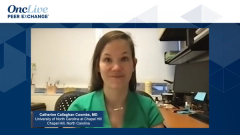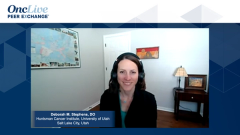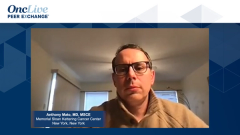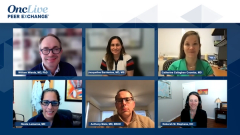
PI3K Inhibitors for CLL
A comparison of 3 PI3K inhibitors—idelalisib, duvelisib, and umbralisib—as treatment for chronic lymphocytic leukemia.
Episodes in this series

Transcript:
William Wierda, MD, PhD: There’s another category of drugs that we haven’t talked about much but that we have available…are drugs that inhibit PI3 kinase. Idelalisib was the first drug available. That drug had adverse effects and toxicity associated with it. Perhaps some of the subsequent PI3 kinase inhibitors were better tolerated. Idelalisib is approved, and so is duvelisib, for the treatment of relapsed CLL [chronic lymphocytic leukemia]. Umbralisib is not approved, but I’m anticipating we’ll hear something about approval soon from the FDA. Debbie, can you summarize where we’re at with PI3 kinase inhibitors and how they fit into our treatment algorithm. I know Anthony’s group reported out their work with umbralisib. Perhaps you can summarize us that abstract. We can also have Anthony comment on it.
Deborah M. Stephens, DO: Umbralisib is the newest drug in this class of PI3 kinase inhibitors, and it’s different because it also inhibits something called casein kinase 1 epsilon. There are multiple mechanisms of action, but it also prevents translation of oncoproteins and helps slow and control growth of lymphoma cells. There haven’t been any head-to-head comparisons of umbralisib vs idelalisib or duvelisib. To anyone who’s used all those drugs, it’s pretty clear that umbralisib does have a better toxicity profile. You don’t see as many of those autoimmune adverse effects that were seen early with idelalisib. There’s a large study, called UNITY-CLL, that looks at umbralisib paired with another anti-CD20 monoclonal antibody, ublituximab, that was given in both relapsed and refractory but also in the front line. That’s notable because frontline use of idelalisib or duvelisib would result in severe autoimmune toxicities. However, the umbralisib combination seemed to be very well tolerated in these patients.
The interesting question you ask is where should we use these drugs? At this minute, as far as standard of care using umbralisib, it’s at least a third-line therapy. I would give preference to using a BTK inhibitor and venetoclax over umbralisib unless there’s some major contraindication—we’ve gotten great at managing these toxicities and with different comorbidities. Anthony and Callie just talked about these third-generation BTK inhibitors, which are even more tolerable and probably more efficacious. Does that push them to fourth-line therapy? Where to use them is interesting. Umbralisib is a great drug, and it probably will get approved in the frontline and relapsed settings based on the UNITY study.
Anthony’s group had an interesting concept in that using umbralisib in combination with the anti-CD20 ublituximab as a way to solidify remissions in patients who have been continuously on ibrutinib but still have residual disease. They gave this combination continuously until the patients achieved MRD [minimal residual disease] undetectable status and then confirmed it again a month later. This study is still a little early, but they presented 24 patients, and two-thirds of those patients were able to reach MRD undetectability. The median time off therapy is around 8 months. That’s meaningful clinically, especially if patients are having adverse effects to these drugs. At the time of analysis, they reported about three-quarters of these patients were still MRD undetectable.
It’s an interesting concept, but it’s unclear to me if it’s necessary to add the potential toxicity of these drugs. Both ublituximab and umbralisib were used, and we’ve talked a lot about how CD20s can induce MRD-undetectable remissions. How much of the work was done by umbralisib? How much was done by ublituximab? Do you need both? Do you need it at all? In patients who are tolerating ibrutinib well, maybe it’s just as good to continue on them even though they don’t have MRD undetectability.
Transcript edited for clarity.










































